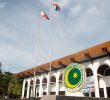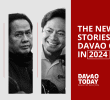By Jeremaiah M. Opiniano
Institute for Migration and Development Issues
MAKATI CITY � What do we want to do with international migration? That question posed by outgoing Labor secretary Patricia Sto. Tomas before businesspeople recently was a Miss Universe type of question.
But the disparity of answers was expected–revealing the good and bad about this phenomenon, and the things to be proud of and to be embarrassed about.
Nevertheless, influential businessman Jaime Augusto Zobel de Ayala gave his five cents worth on the overseas migration phenomenon: �I truly believe that protecting the welfare of our people abroad is important, but we should embrace the phenomenon.�
International migration is �a source of strength for the country, and thus we should find ways to structure it in a way that provides benefits to us,� he adds. �Welfare of Filipinos abroad is not the whole pie, and we need a competitive Filipino worker abroad for us to survive.�
Zobel de Ayala�s remark is not new, and was said in this way three years ago: �The time for us to weep about OFWs (overseas Filipino workers) is over.� Sto. Tomas was even precise: �The welfare cases facing some Filipinos abroad are only a small fraction to the nearly a million workers being deployed every year.�
But what is new with Zobel de Ayala�s remark is the socio-economic situation where the country is in currently, and how do Filipinos see themselves today while some citizens continue their exodus. We have an economy that is consumption-driven, buoyed by services and not agriculture and industry, and is systemically propped up by dollars, dirhams and dinars from citizens abroad.
�Overseas migration by Filipinos undergoes an evolution,� adds Sto. Tomas–and we are seeing it right now.
�Domestic helpers� dollars service RP�s debt,� reads a 2004 headline by Agence France Presse when the country, then with a looming fiscal crisis, was saved by maids� paychecks in Hong Kong. They are among the semi-skilled and skilled Filipino workforce overseas who is �the country�s best marketing tool,� says Sto. Tomas. They are also �our selling position abroad,� says shipping magnate Doris Magsaysay-Ho.
Don�t forget the medical professionals, plant and machine operators, musicians and overseas performing artists, seafarers, and even the undocumented workers in Sabah, Malaysia who also made their work and permanent or unauthorized residency abroad as the major source of foreign exchange for the Philippines. �Filipinos remain the most preferred workers abroad,� some businesspeople said, and the demand is overflowing–from Norway to even in Iraq and Afghanistan, where some military facilities wanted to hire Filipinos as police and military bodyguards.
This face of Filipinos� international migration vis-�-vis the country�s development conditions was not there in 1906, the first recorded Filipino overseas exodus in the 20th century when sugar plantation workers went to Hawaii in the United States. It was not there in 1974 when former president Ferdinand Marcos introduced overseas employment, and right after the death of Flor Contemplacion in 1995 that highlighted the feminization of Filipino overseas migration.
Fortunately or unfortunately for Filipinos, we are now in a �migration economy,� as a January 2005 cover story by Newsweek reads. And whether we like it or not, the queue at our international airports will be longer, the same with the queues at money changers and at the Philippine Overseas Employment Administration (POEA) office for overseas job hunts.
Zobel de Ayala�s words at that gathering of researchers studying migration and its development implications are strong words. Not because this prominent personality said so, or I fully or partly agree–or disagree–with him.
Zobel de Ayala�s thoughts on international migration and development for the Philippines are strong is because these open the floodgates for the country and its people to both enjoy and endure the costs and benefits of international migration in the long term. The phenomenon is not entirely bad, nor entirely good. It does bring good things, as well as bad, to us.
�Do you agree that international migration should be the economic development strategy of the country right now?� asked Scalabrinian father Edwin Corros. Nobody directly answered him, and PHINMA chief executive Ramon del Rosario acknowledges the �split in views� with regard to migration and development.
The Filipino individual�s decision to migrate �is rational,� says economist Leonardo Lanzona of Ateneo de Manila. But when millions of Filipinos make that �rational� decision, is it good for Philippine society? That is another tough question to answer, especially when Filipino pilots and nurses enjoy salaries thrice as more as what were earned back home.
And many of these Filipinos will not go back home for good. Remember, individually they made a rational decision, and that is always respected.
We can�t stop Filipinos from leaving abroad, even as migration overseas is now �a permanent fixture� into Filipinos� socio-economic lives. The world as well is beginning to see why international migration is becoming an important global development concern side-by-side with globalization. We can�t even put a cap to international migration, said leading migration expert Stella Go of De La Salle University.
But are we gaining more than losing as a country because of international migration? Who benefits anyway? Despite a rich reservoir of research on international migration (both using empirical and anecdotal evidence), the answers do not point to a precise conclusion.
We as a nation better brace ourselves for a Filipino future that can either make or break us with international migration beside it. Surely people are still searching for precise answers� especially coming from diverse real-life experiences and solid research�whether international migration has been good or bad to the country.
Nevertheless, we better be prepared.
Not only to train and professionalize our global Filipino workers, as suggested by Zobel de Ayala. I think we need to prepare many things: the domestic labor workforce, investment and business climate, people�s welfare both here and abroad; the rights and welfare of Filipinos abroad that ought to be protected and upheld; the type of political governance we are in; and many, many others.
It is like what we need is an almost total overhaul of the Philippines, making the domestic economy so robust (at least 10 percent growth in gross domestic product annually for 25 years, says Manolo Abella of the International Labour Office) that it becomes a magnet for Filipinos abroad to go back home.
Thus, the international migration issue is �not an isolated thing anymore from national development policy,� observes Magsaysay-Ho. Like many others, Magsaysay-Ho is in search of ways�as well as policies�how to make international migration and its �bonus� resources such as remittances and technology transfer work best for the country.
To minimize the socio-economic costs brought about by migration is the destined direction, and it is something that many agree in this heated debate.
�But what is your vision of the country?� asks Dr. Federico Macaranas of the Asian Institute of Management (AIM) Policy Center. That is another Miss Universe question, and it even has economic, social, political, and cultural facets that are subjects of another debate.
The multifarious opportunities and issues surrounding Filipinos� international migration are finally discussed head on publicly. Meanwhile, Filipinos abroad have never enjoyed this much attention, and are even looked at now as �the fulcrum that will lead Filipino society�s transition to modernity,� says sociologist Randy David.
But the outgoing Labor secretary thinks �there seems to be a (public) neurosis about OFWs. Do we want it (migration) or not?� You may not want to answer that question right now, or you can just be mum about it. Whether exporting people is declared explicitly or not as government�s development policy, Filipinos will go out anyway.
But Filipino families, communities and sectors, and the country as a whole, must brace themselves because the country�s future beside the exodus will, at the very least, be challenging. All that we can do is to encourage everyone, especially Filipinos abroad that made those rational decisions, to help overcome these challenges and still individually benefit in the end.
(Jeremaiah M. Opiniano, who teaches journalism at the University of Santo tomas, runs the two-year-old nonprofit Institute for Migration and Development Issues (IMDI), which does research, advocacy, networking, and development journalism on migration and development issues in the Philippines. He can be reached ofw_philanthropy@yahoo.com)










